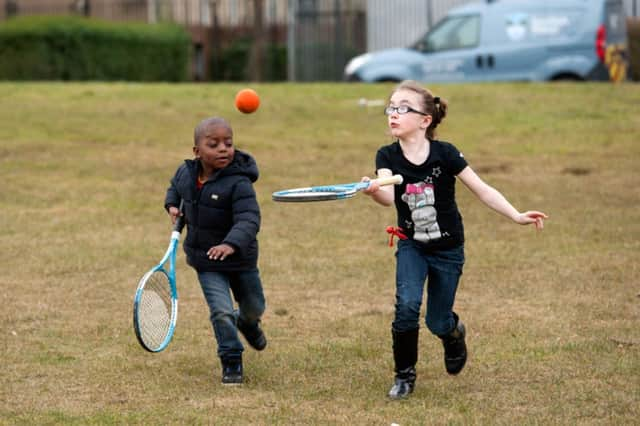Break down the barriers to active and healthy play


THE latest Scottish Health Survey reminds us all that we need to improve our nation’s physical activity levels –we need to encourage both adults and children to get moving more. To do this, we need to introduce children to an active way of life from the earliest possible age.
We all know that play is good for children and a universally accepted right that children have access to play. However, at times we don’t always make the connection between play being good and fun, and how a child develops the skills, confidence and behaviours necessary for lifelong physical activity.
Advertisement
Hide AdAdvertisement
Hide AdNot only does play help with the development of social skills, it also helps with the development of fundamental movement skills. Jumping, balancing and hand eye co-ordination can all be developed through play, and when we don’t learn these basic skills, it becomes more of a challenge to take to physical activity in the future.
We need to create more opportunities for children to develop the fundamental movement and skills through play, which in the longer term will enable an active way of life. By providing children with a positive introduction to physical activity through play we can lay the foundations for children to adopt a healthier lifestyle, leading to higher levels of physical activity.
So it all starts with play. However much of the problem is we have a generation who have not only forgotten how to play, but are faced with too many barriers to play, and therefore, opportunities have decreased slowly.
The rise of game consoles, busier streets and declining green or perceived good play spaces – and the confidence to use these, are all cited as reasons for less street and outdoor play. Perception of risk among parents also means children are less likely to be playing outside in their local community, or on their own. In 2013, Scottish children were rated F, the worst rating, in the Active Healthy Kids Report Card a ‘state of the nation’ in relation to levels of sedentary behaviour.
We’ve also become a little intolerant to children playing especially in public spaces. No ball games signs a case in point!
Professor John Reilly, who leads the Active Healthy Kids Scotland Report Card also sees the benefits of play and the strong links between play and physical activity and the incidental activity which can often take place outside and through play. Despite these barriers and challenges we must find ways to overcome them and I’m encouraged that we are. Through the Go2Play Fund Inspiring Scotland delivers in partnership with Scottish Government we have invested in Play Rangers: an effective model of helping children and communities reclaim their streets, parks and woods.
They also teach children and families to play freely and help communities to change their attitudes to play. Based in the east end of Glasgow, Possibilities for Each and Every Kid, (PEEK) are a good example of Play Rangers in Action.
Building on their street play, PEEK recently piloted an active play programme in partnership with Active East and three sporting organisations to increase levels of physical activity and explore how involvement in physical play could lead to participation in sports activities, and therefore, potentially a healthier lifestyle.
Advertisement
Hide AdAdvertisement
Hide AdThe project involved children aged five to 13 in active, street play in three sites in the north-east of Glasgow. Street play activities aimed to build physical skills and confidence. Sports taster sessions were then delivered, followed by sport-specific sessions. The project was successful in engaging more than 200 children from vulnerable communities. It was also successful in introducing children to sports with 49 per cent of children progressing to sport-specific activities. But more importantly, children developed new friendships, were more confident, developed independence and demonstrated increased physical capacity. It also showed that children improved their physical literacy – their fundamental movement skills – through play. Inspiring Scotland has worked with the Scottish Government to invest in play for the past five years. During this time Scotland has committed to its first ever national play strategy with a vision to become a nation that values play. To deliver this we benefit from a strong sector who work hard to ensure play stays high on the agenda.
My organisation was established to tackle some of Scotland’s toughest and most challenging social issues and invest in and support effective organisations who can create a lasting change – for us the need to, and the case for, investing in play is clear.
• Celia Tennant is chief executive of Inspiring Scotland